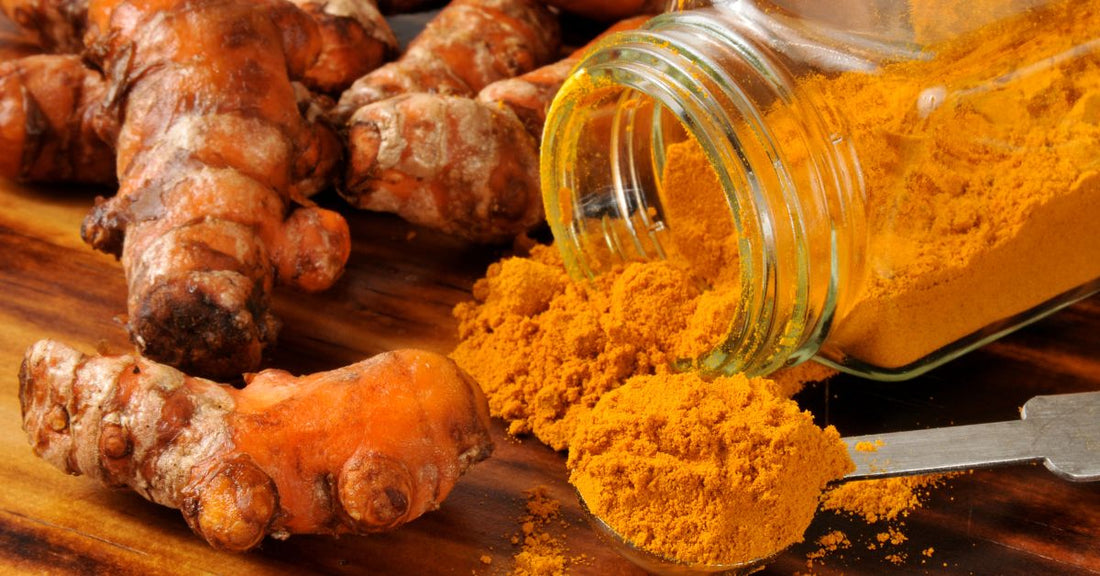
Unlocking the Golden Powerhouse: Exploring the Evidence-Based Benefits of Turmeric
Share
Turmeric, the vibrant yellow spice that lends its warm hue and earthy flavor to countless dishes, is much more than just a culinary staple. Derived from the rhizomes (underground stems) of the Curcuma longa plant, a member of the ginger family, turmeric thrives in warm climates. It has a rich history in traditional medicine. For centuries, it has been prized for its potential health-promoting properties, and modern science is increasingly validating these ancient uses.*
Unveiling the Key: Curcumin and Its Potential

At the heart of turmeric's benefits lies curcumin, its primary bioactive compound. While turmeric itself contains a relatively modest amount of curcumin (typically 2% to 9%), this potent polyphenol is responsible for the majority of the spice's acclaimed health benefits.
A Legacy of Healing: Traditional Uses and Emerging Science

For millennia, Ayurvedic and Traditional Chinese Medicine have harnessed the power of turmeric to address a wide spectrum of ailments, including skin disorders, respiratory issues, joint discomfort, and digestive disturbances. In recent times, turmeric has surged in popularity as a dietary supplement, touted for its potential to support conditions ranging from arthritis and digestive problems to mood disorders and allergies.
The past few decades have witnessed a surge in scientific exploration into turmeric's therapeutic potential. A comprehensive 2020 study highlighted curcumin's remarkable array of properties, including anti-inflammatory, anticancer, antidiabetic, antimicrobial, antiviral, and antioxidant effects.
Intriguingly, emerging human studies are beginning to connect these properties to tangible health benefits. For instance, research suggests that curcumin may play a role in managing the pain associated with osteoarthritis. However, it's crucial to acknowledge that while these initial findings are promising, further rigorous research is essential to fully elucidate the broader spectrum of turmeric's benefits and determine optimal dosages for various health outcomes.
Integrating Turmeric into Your Daily Life: Culinary Delights and Beyond

Embracing the potential benefits of turmeric can be as simple as incorporating this versatile spice into your everyday cooking. A cornerstone of Indian cuisine, turmeric lends its distinctive color and flavor to curries and countless other dishes. Remember that consuming turmeric with healthy fats, such as oils, can significantly enhance the absorption of curcumin in your digestive system.
Here are some delicious and easy ways to weave turmeric into your diet:
- Warm Beverages: Stir a pinch into your morning coffee or tea for an earthy note.
- Golden Milk: Indulge in the soothing warmth of golden milk by gently simmering 1 to 2 teaspoons of turmeric with 1 cup of milk (dairy or non-dairy), a dash of black pepper, a sprinkle of cinnamon, and a touch of honey or maple syrup for about 10 minutes.
- Flavorful Meals: Add a teaspoon to soups, broths, roasted vegetables, and vibrant rice dishes.
- Hearty Stews: Enhance the depth of flavor in lentil or bean stews with a pinch of turmeric.
Concentrated Power: Exploring Turmeric Supplements
For a more concentrated dose of curcumin, turmeric supplements are also available. These supplements can contain a significantly higher percentage of curcumin, often reaching up to 95%.
The Arthritis Foundation, for example, suggests a dosage of one 500 mg capsule of curcumin extract taken twice daily for managing symptoms of osteoarthritis and rheumatoid arthritis.
To maximize the absorption of curcumin from supplements, consider options that include piperine, a natural compound found in black pepper known to enhance curcumin bioavailability. Additionally, taking turmeric or curcumin supplements with a meal that contains fats can further improve absorption.
Navigating Safety and Quality: Important Considerations
The FDA generally recognizes turmeric and curcumin supplements as safe, and studies indicate they are typically well-tolerated even at relatively high doses (up to 8 grams per day). However, it's important to be aware that high doses may potentially lead to abdominal discomfort, nausea, and diarrhea.
As with all dietary supplements, it's crucial to exercise caution regarding regulation. The FDA does not strictly regulate the content of supplements, which means the actual amount of curcumin in a product may vary from the label. Furthermore, supplements may contain inactive or even potentially harmful ingredients. Notably, ground turmeric has been identified as a potential source of lead contamination in some instances in the U.S.
Therefore, it is always advisable to consult with your healthcare provider before incorporating turmeric or curcumin supplements into your routine, especially if you have any underlying health conditions or are taking medications. This is particularly important if you are:
- Taking blood thinners
- Scheduled for surgery
- Pregnant or breastfeeding
- Diagnosed with gallbladder disease
- Undergoing chemotherapy
Individuals with diabetes should also be aware that turmeric may potentially lower blood sugar levels.
